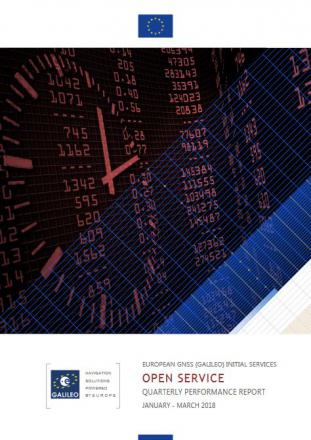The first Open Service Quarterly Performance Report of the year, covering the period from January to March 2018, has been published under the Performance Reports section of the GSC web portal.
The fifth Open Service (OS) Performance Report,  and the first of 2018, is available in the Electronic Library, providing the status of the Galileo constellation and the achieved performance over the reporting period (January, February and March 2018).
and the first of 2018, is available in the Electronic Library, providing the status of the Galileo constellation and the achieved performance over the reporting period (January, February and March 2018).
These quarterly reports provide the public with the latest information on the Galileo Open Service measured performance statistics with respect to their Minimum Performance Levels (MPLs), as declared in the Galileo OS Service Definition Document (OS SDD), in particular, on parameters such as:
-
Galileo Initial OS ranging performance,
-
Galileo Coordinated Universal Time (UTC) dissemination,
-
Galileo to GPS Time Offset (GGTO) determination performance,
-
Galileo Positioning performance, and
-
Timely publication of NAGUs (Notice Advisory to Galileo Users).
Highlights from Q1 2018
As in the past year, the Galileo OS measured performance figures generally comfortably exceed their MPL thresholds.
Some highlights from the Q1 2018 performance report:
-
The Availability of both the Galileo Ranging Service at the Worst User Location (WUL) and the Healthy Signal were significantly above expectations (all above the threshold of 87%), with Availability reaching values of 100% in February and March.
-
The monthly Availability of both the Galileo UTC Determination and the GGTO Determination were achieved, with all monthly values exceeding the MPL targets (87% and 80% respectively).
-
The target MPLs for Publishing NAGUs were met in all cases, for both Planned and Unplanned events. Eight NAGUs have been published on the GSC web portal in the reporting period, none of which referred to unplanned events affecting the Space Segment.
For the most up-to-date information on the Galileo system and constellation, visit the European GNSS Service Centre (GSC) website, in particular, the Galileo constellation status section. For more details on Galileo performance and its services, do not hesitate to contact the Galileo Help Desk.
Media note: This feature can be republished without charge provided the European GNSS Agency (GSA) is acknowledged as the source at the top or the bottom of the story. You must request permission before you use any of the photographs on the site. If you republish, we would be grateful if you could link back to the GSA website (http://www.gsa.europa.eu).